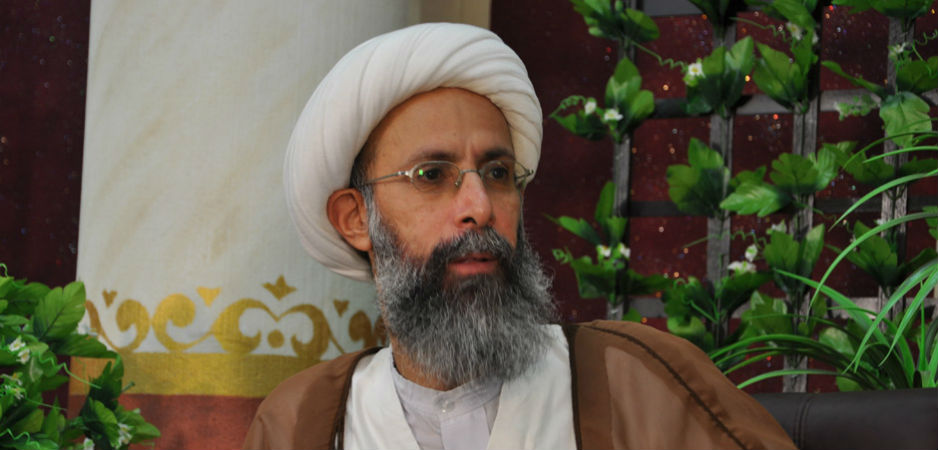The killing of Sheikh al-Nimr should serve as a prime moment for the US to reconsider its alliance with Saudi Arabia, says Medea Benjamin.
The brutal Saudi execution of Shia cleric Sheikh Nimr al-Nimr has led to protests around the Muslim world, as well as the burning of the Saudi Embassy in Tehran, followed by Saudi Arabia severing relations with Iran. This exacerbation of Sunni-Shia tensions is the result of the reckless Saudi action against a popular, nonviolent Shia Muslim leader. Also reckless is the US government’s response, failing to condemn the Saudi government and distance itself from the regime.
On January 2, the Saudi government executed 47 people, most of them by beheading. Those executed included Sunnis convicted of al-Qaeda-affiliated attacks, as well as Shia opponents—Nimr and three others arrested when they were still juveniles.
The killing of Nimr has sparked a massive reaction because he was a prominent religious leader who defended the Shia minority and criticized the abuses—both domestic and foreign—of the Saudi regime. He supported the 2011 anti-government protests in Saudi Arabia’s Eastern Province, protests that erupted in the wake of the Arab Spring. The oil-rich Eastern Province is home to some 2 million Shia Muslims, who have long complained of discrimination by the Sunni government.
In response to increasingly vocal demands for reforms from Shias, who constitute about 15% of the total population, Saudi authorities waged a harsh crackdown. Nimr was arrested and imprisoned in 2012, then convicted of sedition, disobedience and bearing arms. He did not deny the political charges against him, but insisted he never carried weapons or called for violence.
He also distanced himself from sectarian divisions. He called for people to stand up to tyrants regardless of their sect—from the Sunni rulers in Bahrain to Syria’s Bashar al-Assad, who is from the Alawite sect of Shia Islam. “Sheikh al-Nimr preached that we should support the oppressed against the oppressor, regardless of religion,” said Gulf scholar Ali al-Ahmed. To add insult to injury, Sheikh Nimr’s nephew, Ali al-Nimr, was targeted and arrested at the age of 17 for protesting government corruption, and he has since been sentenced to beheading and public crucifixion.
The Saudi government was well-aware that killing Nimr would enrage Shia Muslims both inside and outside the country. Saudi actions abroad have already raised sectarian tensions, such as the 2011 Saudi military intervention in Bahrain to crush a democratic revolt dominated by the country’s majority Shia. The Saudi military intervention in Yemen against the Houthis (a Zaidi Shia group), an ongoing intervention that has killed thousands of innocents and caused a humanitarian crisis, has also angered the Shia community. And Saudi efforts to topple the Iranian-backed Assad regime in Syria also fuel tension between Saudi Arabia’s Sunni leadership and its Shia citizens.
An additional factor fanning ethnic hatred has been Islamic State (IS) attacks on Shia mosques in the kingdom. Many Shia Muslims hold the Kingdom of Saudi Arabia’s religious establishment responsible for the attacks and maintain that Saudi officials turn a blind eye to IS’ sectarian agenda in the country.
The cleric’s execution will also complicate Saudi Arabia’s relationship with the Shia-led government in Iraq, where the Saudi embassy was just reopened for the first time in nearly 25 years.
Saudi-US Relations
The US government has expressed concern that Nimr’s execution risked “exacerbating sectarian tensions at a time when they urgently need to be reduced.” The government understands that the explosive reaction to the Nimr execution has the potential to bring even more bloodshed to the Middle East—from derailing Syria peace talks to prolonging the war in Yemen and rekindling uprisings in Bahrain.
But instead of insisting on Nimr’s release during his years in prison and echoing Amnesty International’s condemnation of his “deeply flawed” trial, the US government was silent. Even after the execution, the US failed to issue a strong denunciation.
For decades, US governments—both Democratic and Republican—have backed Saudi Arabia. The US-Saudi alliance dates back to World War II, when US officials started to see Saudi’s oil as a strategic advantage. Since then, the US has blindly supported the kingdom in almost every political and economic effort, despite the fact that Saudi Arabia is an ultraconservative monarchy rife with human rights abuses.
Saudi Arabia has consistently been ranked by Freedom House as one of the worst humans rights violators in the world. Earning the lowest possible score in all three categories of freedom, civil liberties and political rights, it is one of only ten nations considered “not free.”
The killing of Sheikh Nimr should serve as a prime moment for the US to reconsider its alliance with the Saudi regime—a regime that not only denies human rights to its own people, but exports death and destruction abroad.
The views expressed in this article are the author’s own and do not necessarily reflect Fair Observer’s editorial policy.
Photo Credit: Nimr
 We bring you perspectives from around the world. Help us to inform and educate. Your donation is tax-deductible. Join over 400 people to become a donor or you could choose to be a sponsor.
We bring you perspectives from around the world. Help us to inform and educate. Your donation is tax-deductible. Join over 400 people to become a donor or you could choose to be a sponsor.
Support Fair Observer
We rely on your support for our independence, diversity and quality.
For more than 10 years, Fair Observer has been free, fair and independent. No billionaire owns us, no advertisers control us. We are a reader-supported nonprofit. Unlike many other publications, we keep our content free for readers regardless of where they live or whether they can afford to pay. We have no paywalls and no ads.
In the post-truth era of fake news, echo chambers and filter bubbles, we publish a plurality of perspectives from around the world. Anyone can publish with us, but everyone goes through a rigorous editorial process. So, you get fact-checked, well-reasoned content instead of noise.
We publish 2,500+ voices from 90+ countries. We also conduct education and training programs
on subjects ranging from digital media and journalism to writing and critical thinking. This
doesn’t come cheap. Servers, editors, trainers and web developers cost
money.
Please consider supporting us on a regular basis as a recurring donor or a
sustaining member.
Will you support FO’s journalism?
We rely on your support for our independence, diversity and quality.






